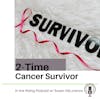A Silent Battle of Lymphedema: Looking In the Struggle of Wendy Williams
Discover the strength it takes to share a personal health struggle with the world, as we did in our latest episode featuring the powerful revelation of Wendy Williams and her battle with lymphedema. Wendy's candidness not only brings this condition into the limelight but also serves as a beacon of information for those silently suffering. Through our in-depth conversation, we unravel the intricacies of lymphedema, emphasizing why early intervention is pivotal and how certified physical and occupational therapists play a crucial role in managing this progressive ailment.
Thank you for your time and interest in this podcast! I invite you to leave a heartfelt review on whichever podcast platform you listen to. It does so much to bring exposure to the podcast and helps lift others up!
To leave a review, helping us spread the contents of this podcast- click on this link! Thank you!
Connect with me!
Website: In the Rising Podcast Website
Email: Bettina@intherising.com
In the Rising Pinterest:
In the Rising Facebook
Check out the Website: Fit after Breast Cancer
In Good Health!
Bettina
Hello and thank you for giving me your time today. I wanted to focus on what is quote unquote trending right now and I use that word with with kind of disgust, but also, in truth, that is what is a lot on the news right now and that is the medical conditions that Wendy Williams is facing right now, and it's tremendous. And I want to, first and foremost, focus on what I think is bravery to share what is happening in your own life and to do it on a public stage, when you have such an audience, and share what, what is actually going on with you. On the other hand, there is one positive thing that comes about with this when celebrities or people who are very, very well known and respected around the globe share what's going on with them is that it brings attention to things like lymphedema that are kind of in the backdrop, because lymphedema doesn't kill you, and if lymphedema is not something that you need medication for, then it will obviously not get the attention of pharmaceutical companies. If you have been diagnosed with lymphedema yourself or you're curious about it because you're wondering if that person, if that parent, if that cousin, if that friend, does not maybe have lymphedema, what should you do? What are some next steps? And the first thing is, if you're diagnosed with it, to do some research. There are people who are certified to treat it. Some of the articles that I've read regarding Wendy Williams do highlight that physical therapists can treat lymphedema, and I want to highlight another point to that so can occupational therapists. So once you are a PT or OT, you can do additional schooling and get certified or board certified through the Lymphology Association of North America to really learn a lot about the lymphatic system and how to treat it. Lymphedema is a progressive condition, but having interventions earlier help reduce the speed of that progression, so that way you do not get to that final phase, which is elephantitis, where you have really fibrotic skin where your hands or whatever body part or feet you're talking about, is several times the size that it would be normally, and so, with that, do some research, ask your primary care doctor or go to the Lymphology Association of North America. Check out their website. There is a section of finding a CLT near me, and that may be a PT or it may be an OT. It could even be a massage therapist, because they will work with people as well and can get certified. Typically, though, insurance only pays for physical and occupational therapy. So if finances have some sort of bearing on your ability to see certain people, start with that route. The other thing I would say is focus on your quality of life. Lymphedema is a condition that is progressive, but it tends to be progressive and annoying in that things that you could do easily seem like they take more work because now you carry some fullness, some heaviness, your clothes don't feel quite the same, and it does affect our confidence. It does affect our self-esteem when we don't look and feel the way we want to or the way we were at one point. So knowing that a diagnosis of lymphedema does not mean you're going to lose sensation, it does not mean that you're going to lose the ability to hold a cup of drinking water, or it's not going to be an absolute reason why you're not able to walk, but it could affect those two examples and make it more difficult, more tiresome, to do some things throughout your day. There are options out there and I would love for you to look into your physical and occupational therapists. The third point I want to talk about is there are some articles that reference lymphedema microvascular surgery, and right now, in most states, at least for sure, for what I know, in 2024,. This is still viewed as experimental by insurance companies, and so they do not cover it. I know other nations around the world are moving in this direction much more and if you have the ability to pay cash for this, this would be a great option for you, but it is not necessary. The only way to quote unquote cure your lymphedema. It is not something that is curable at this moment in time. So, with the highlight of what lymphedema is, what it can look like, what it can change for you, I would like to add a little bit more knowledge. Out there, along with so many wonderful therapists who have their YouTubes and podcasts and what have not Really looking to provide the people we work with the tools they need to ask the questions from the people in front of them. Below is a link to my own podcast, to my own website and my own course about lymphedema and recovery back to your function after breast cancer. So if that's what you're interested in or you feel like, hey, I know someone that would benefit from that, go ahead and share that. It does so much to put podcasts like this one it's not the only one into the hands and the ears of those that it makes the biggest impact for. Thank you so much for giving your time and until next time, let's keep building one another up.



![Episode image for [ITR Short] Triumphs and Reflections of a Cancer Conqueror Episode image for [ITR Short] Triumphs and Reflections of a Cancer Conqueror](https://images.podpage.com/https%3A%2F%2Fstorage.buzzsprout.com%2Fojfqdzb8zfyjt3ao84o1w4cbto8b%3F.jpg?auto=format%2Ccompress&w=100&s=75ff4af7f7137349cf8af82f22fbc34b)
